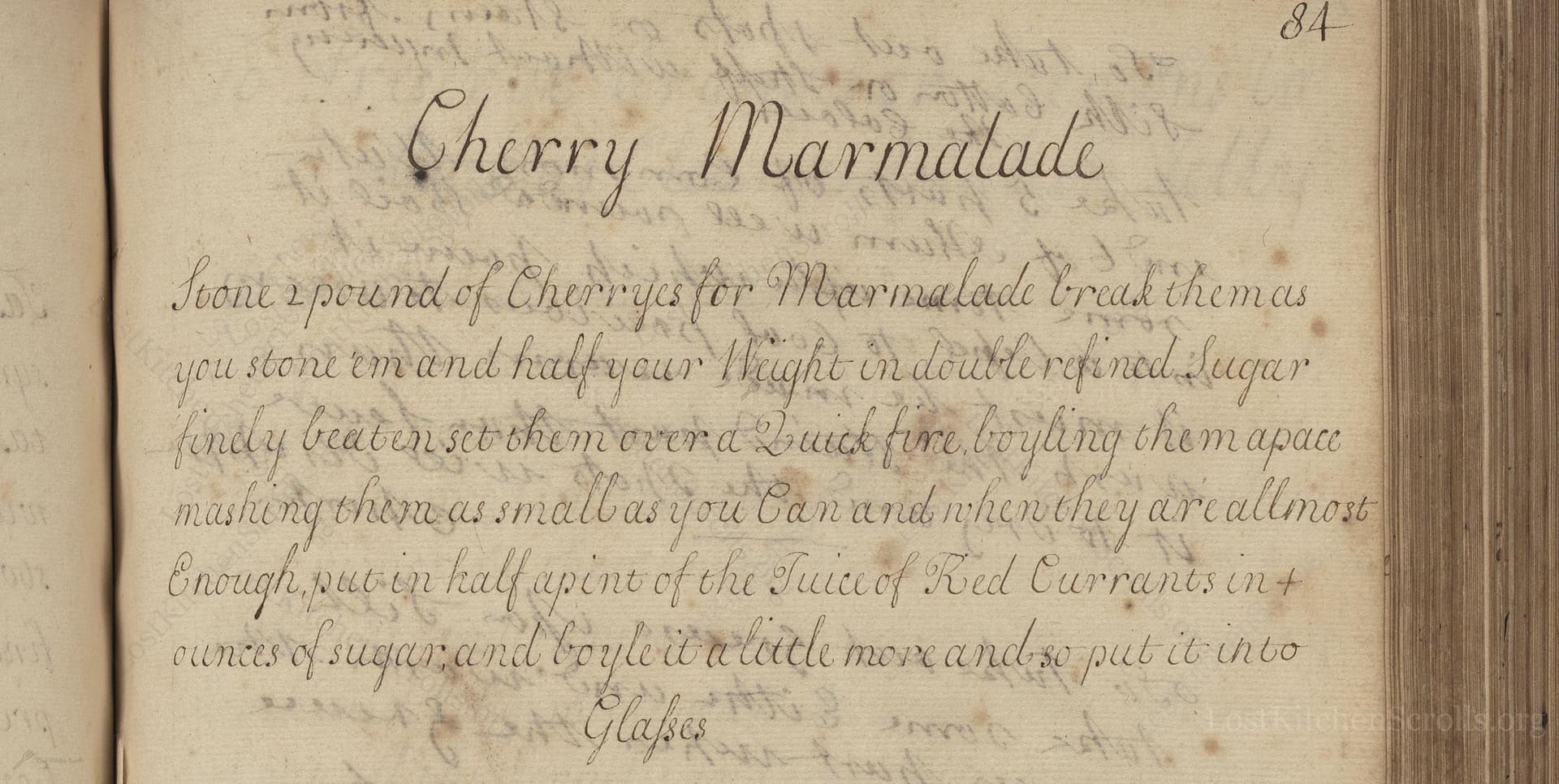
Cherry Marmalade
"Stone 2 pound of Cherryes for Marmalade break them as you stone 'em and half your Weight in double refined sugar finely beat & set them over a Quick fire, boyling them apace mashing them as small as you can and when they are allmost Enough, put in half a pint of the Juice of Red Currants in 4 ounces of sugar and boyle it a litle more and so put it into Glasses"
Note on the Original Text
The recipe is written in the direct, practical style of early modern English household manuscripts. There is minimal punctuation, and spelling varies—e.g., 'Cherryes' for 'cherries' and 'boyle' for 'boil.' Quantities are given in pounds and pints, assuming the cook’s familiarity with such measures. Directions are continuous, presuming the reader's experience in 'setting' jams and managing boiling sugar. The absence of precise timings or temperatures reflects a world before kitchen thermometers, relying instead on visual and textural cues.

Title
Cookery and medicinal recipes of M.W. (1775)
You can also click the book image above to peruse the original tome
Writer
Unknown
Era
1775
Publisher
Unknown
Background
A delightful glimpse into British kitchens of yesteryear, this manuscript collection—attributed simply to 'M. W.'—whisks readers through cherished recipes and culinary wisdom passed down between 1700 and 1850. A treasure trove for those who savor the artistry of historical cookery.
Kindly made available by
Folger Shakespeare Library
This recipe comes from the manuscript collection attributed to 'M. W.' and dates from roughly 1700 to 1850. During this period in England, elaborate preserves were prized in both aristocratic and aspiring middle-class households. Marmalades were not just breakfast fare but elegant confections to be presented to guests or served at tea tables. The use of red currant juice reflects both the seasonality and the variety of fruits available to cooks of the time. Sugar was expensive, so the quantities used demonstrate both wealth and an understanding of preservation science as it was evolving during this period.

In the early 18th to mid-19th centuries, marmalade would have been cooked in a heavy copper or brass preserving pan over an open hearth or coal stove. Cherries would be stoned with a small knife or by hand, and sugar finely ground using a mortar and pestle. The boiling would be managed with strong arms and patience, employing wooden stirring paddles or spoons. Finished marmalade was poured into glass jars or tall glasses and covered with parchment and string or a wax seal.
Prep Time
20 mins
Cook Time
35 mins
Servings
8
We've done our best to adapt this historical recipe for modern kitchens, but some details may still need refinement. We warmly welcome feedback from fellow cooks and culinary historians — your insights support the entire community!
Ingredients
- 2 lb fresh cherries, pitted
- 1 lb caster sugar (double-refined sugar)
- 1 cup red currant juice (store-bought or homemade)
- 4 oz sugar (for currant juice)
Instructions
- Begin by weighing 2 pounds of fresh cherries and removing their stones, crushing the fruit lightly as you go.
- Measure out 1 pound of double-refined (caster) sugar and set aside.
- Take a large saucepan, combine the cherries and sugar, and place over medium-high heat, stirring often to help break down the fruit.
- Boil briskly until the mixture thickens and the fruit is well mashed—this should take about 20-30 minutes.
- Meanwhile, in a small saucepan, combine 1 cup of red currant juice with 4 ounces of sugar and heat gently to dissolve.
- When the cherry mixture is nearly set, pour in the sweetened currant juice and boil for a few more minutes until everything has thickened to your liking.
- Immediately transfer the hot marmalade into sterilized glass jars or glasses, and seal when cool.
Estimated Calories
220 per serving
Cooking Estimates
You need about 20 minutes to pit and crush the cherries and prepare the other ingredients. Cooking the cherries and dissolving sugar in currant juice will take around 35 minutes. The recipe makes 4 jars, and each jar is about 250 ml. Each serving contains approximately 220 calories.
As noted above, we have made our best effort to translate and adapt this historical recipe for modern kitchens, taking into account ingredients nowadays, cooking techniques, measurements, and so on. However, historical recipes often contain assumptions that require interpretation.
We'd love for anyone to help improve these adaptations. Community contributions are highly welcome. If you have suggestions, corrections, or cooking tips based on your experience with this recipe, please share them below.
Join the Discussion
Rate This Recipe
Dietary Preference
Main Ingredients
Culinary Technique

Den Bockfisch In Einer Fleisch Suppen Zu Kochen
This recipe hails from a German manuscript cookbook compiled in 1696, a time whe...

Die Grieß Nudlen Zumachen
This recipe comes from a rather mysterious manuscript cookbook, penned anonymous...

Ein Boudain
This recipe comes from an anonymous German-language manuscript cookbook from 169...

Ein Gesaltzen Citroni
This recipe, dating from 1696, comes from an extensive anonymous German cookbook...
Browse our complete collection of time-honored recipes



